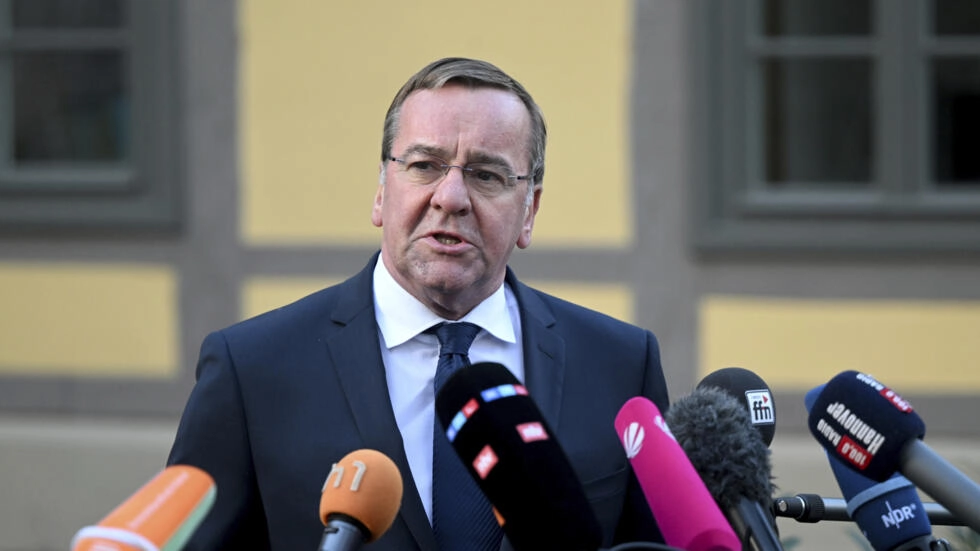(RFI) Chancellor Olaf Scholz on Tuesday (17) confirmed the appointment of Social Democrat Boris Pistorius as Germany’s defense minister. Pistorius, who was until now interior minister of the state of Lower Saxony, was described by the German chancellor as “the right person” to lead “the change of era” brought about by the war in Ukraine.
Boris Pistorius is “a highly experienced politician who has been involved in security policy for several years (…),” Scholz said in a statement. He will replace Christine Lambrecht, who resigned on Monday (16), weakened by a series of gaffes and controversies. Lambrecht was at the center of criticism, especially after she posted a New Year’s Eve congratulatory video in which she thanked him for the “encounters” that the war in Ukraine provided her.
The appointment of Pistorius, 62, is being praised internally in the SPD, the party of the German head of government, but is criticized by the opposition, according to news portal Der Spiegel. Among the troops, however, the choice of the politician from Lower Saxony was well received. He is expected to take office on Thursday (19).
Finance Minister and leader of the liberal FDP party, Christian Lindner, congratulated Pistorius on Twitter. “We have a big task ahead of us, especially with the implementation of the special fund, and I look forward to good cooperation,” Lindner wrote to his future cabinet colleague.
In February, Chancellor Olaf Scholz announced a project involving a record €100 billion investment to re-equip the Armed Forces.
This appointment comes at a time when Germany is under pressure from other European countries to supply heavy tanks to Ukraine. But being defense minister in a country that, because of its Nazi past, has for decades promoted pacifism, has always been a delicate, not to say empty position. The Russian invasion of Ukraine turned this page in history. And Berlin has committed itself to the largest rearmament operation in Germany since World War II.
Until recently, nobody wanted to hear about spending a single euro on the German Army. However, the war has given relevance to the defense portfolio and has exposed the contradictions and ambiguities of the security policy of the largest country in the bloc in population and the first economy of the European Union.
Chancellor Olaf Scholz has been hesitant about the military doctrine adapted to the current challenges. The country finds itself in a dilemma between restraint and boldness. Scholz is willing to help Ukraine, but does not want to commit too much; he knows he must protect himself from Russia, but tries not to upset Moscow.
Meeting of the Allies in Germany
Next Friday (20), there will be a meeting of the Western allies at the American base in Ramstein in western Germany to detail and coordinate the shipment of new military equipment insistently requested by Kiev.
Scholz and his new defense minister are expected to clarify Berlin’s position. The allies have increased pressure on Germany to join an international coalition to jointly ship heavy tanks or at least allow the re-export of these vehicles.
Poland has promised to supply modern German Leopard 2 tanks to Kiev, but it depends on Berlin’s permission, since the equipment is manufactured in the country and its re-export can only happen after the German government’s approval. This sophisticated model is capable of quickly opening new trenches. Besides Poland, other countries in the bloc have Leopard 2 tanks in their arsenals.
In early January, the German government had already decided to supply Ukraine with about 40 Marder infantry fighting vehicles. Delivery is planned by the end of the first quarter.
The UK has also announced that it will send its modern Challenger 2 tanks to Ukraine. France will contribute light combat tanks of the AMX-10 RC model.
The expectation is that after this meeting in Ramstein, Berlin will announce the decision to enable the supply of Leopard 2 tanks to Ukraine, breaking yet another paradigm of German defense policy.
Escalation of the conflict?
Almost a year after the war began on February 24, 2022, and without achieving the military victories it had hoped for, Russia has been systematically bombing Ukrainian infrastructure – power plants and the drinking water distribution network, particularly in the Kiev region.
Moscow has warned that the supply of heavy tanks to Ukraine would mark a new and dangerous escalation of the conflict, which has already left thousands dead, millions homeless and refugees, and has reduced Ukrainian cities to ruins.
On Monday (16), at the World Economic Forum in Davos, the Ukrainian delegation, led by First Lady Olena Zelenska, repeated that the country is destroyed and can only resist Russia with international aid.
Analysts consider that without support from Europe and the United States, Ukraine will not be able to defend its territory. Many fear that the delivery of Western arms will come too late, since Moscow is already preparing a counteroffensive for the end of winter and may even begin a new campaign of recruiting fighters.
*** Translated by the DEFCONPress FYI Team ***
